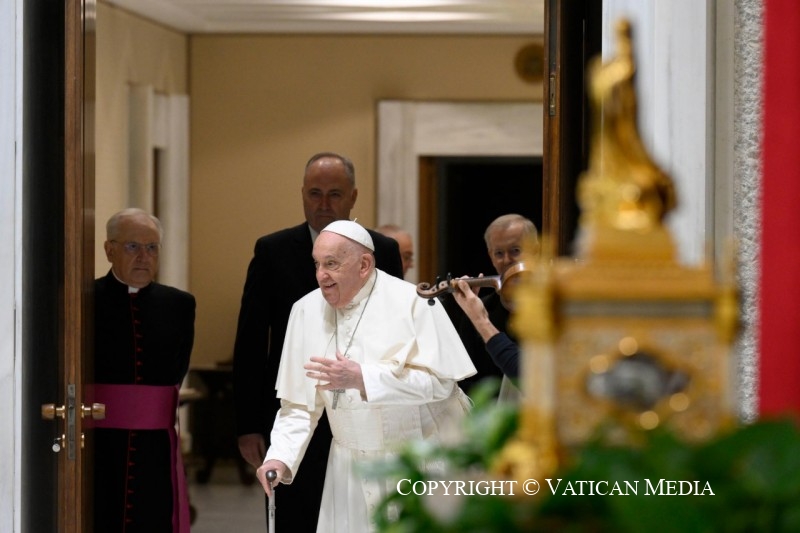Francis begins a new cycle of catechesis for the jubilee on 'Jesus Christ Our Hope'
At the Wednesday audience, the pontiff began his reflection on Christ's childhood. The meanings related to genealogy are explained with women's names at the start of the Gospel of Matthew. "No one gives life to himself, but receives it as a gift from others,” he said. For Christmas, the pontiff is encouraging the faithful to put up a nativity scene at home. “This,” Francis said, “is an important element of our spirituality and culture”. He also called for prayers for peace in the Middle East, Ukraine and Myanmar.
Vatican City (AsiaNews) – This morning during the Wednesday general audience, Pope Francis inaugurated a cycle of catechesis titled "Jesus Christ our hope" that will be developed in coming audiences weeks and last throughout the jubilee year. Some 7,000 people attended today’s meeting held indoors at the Paul VI Hall in the Vatican.
Christ is “the aim of our pilgrimage, and He Himself is the way, the path to follow,” the pontiff said a few days before the opening of the Holy Year whose motto is “Pilgrims of hope”.
Today, after the multilingual reading of the Gospel according to Matthew on the "genealogy of Jesus" (Mt 1:1-3, 15-16), the pope spoke about Christ’s infancy and the meanings of genealogy at the start of the Gospel of Matthew.
“The Infancy Gospels recount Jesus’ virginal conception and His birth from Mary's womb; they recall the messianic prophecies fulfilled in Him and speak of the legal paternity of Joseph,” Francis explained.
Stressing the differences between the Evangelist Luke, who recounts the events "through Mary’s eyes," and Evangelist Matthew who does it “through Joseph’s”, the pope notes that “Matthew begins His Gospel and the entire New Testament canon with the ‘genealogy of Jesus Christ, the son of David, the son of Abraham’ (Mt 1:1).”
A list of names is present in the Hebrew Scriptures with “a number of figures who are problematic to say the least”, but in the end, “everything culminates with Mary and Christ.”
Through the genealogy, it is possible to learn that "no one gives life to himself, but receives it as a gift from others. In this case, the chosen people, and those who inherit the legacy of faith from their forefathers”.
Compared to the genealogies of the Old Testament, women's names are also present in the one that starts the entire New Testament canon, in a culture in which “the father imposes the name on the son”.
There are five names: Tamar, Rahab, Ruth, Bathsheba, and Mary of Nazareth. “The first four women have in common not the fact that they are sinners, as is sometimes said, but the fact that they are foreign to the people of Israel," the pope explained.
While they are "mentioned alongside the man who was born of them or the one who begot him, Mary, on the other hand, acquires particular prominence," he added. “She marks a new beginning. She herself is a new beginning, because in her story it is no longer the human creature who is the protagonist of generation, but God himself."
The verb "was born" suggests this link to the presence of Mary. “Jacob [was] the father of Joseph the husband of Mary, of whom Jesus was born” (Mt 1:16) reads the text. Jesus is “True God and true man.”
Francis concluded the catechesis calling on the faithful to awake “in ourselves the grateful memory of our ancestors. And above all, let us give thanks to God, who, through Mother Church, has generated us to eternal life, the life of Jesus, our hope.”
At the end of the audience, addressing Italian-speaking pilgrims, the pontiff spoke about Christmas, which is just around the corner. This day is “near and I like to think that there is a nativity scene in your homes," he said, referring to the tradition created in 1223 by Saint Francis of Assisi, who staged the first representation of the nativity.
"This important element of our spirituality and culture is an evocative way to remember Jesus who came to dwell among us,” Francis said.
Finally, the pontiff issued another appeal for peace in the world. "Let us pray for peace. Let us not forget the people who suffer from war: Palestine, Israel, and all those who are suffering, Ukraine, Myanmar," he said.
“Let us not forget to pray for peace, that wars may end. Let us ask the Prince of Peace, the Lord, to give us this grace, peace, peace in the world. War, let us not forget, is always a defeat. All the time. War is always a defeat.” A long applause followed these words.
31/01/2024 17:16







.png)










